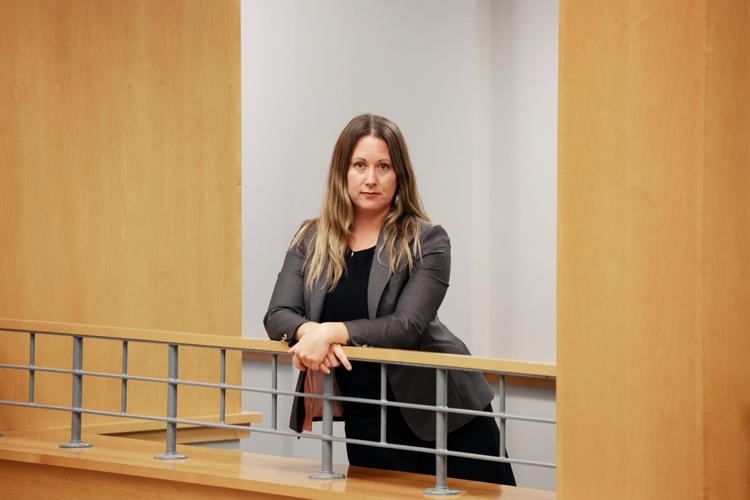Denver Public Schools’ legal argument could topple its debt strategy in Colorado | ANALYSIS

FILE PHOTO: Kepner Beacon Middle School sixth grade science teacher Maureen Morton-Navarro talks with a student about their shared fandom of the Care Bears as she and students wait to hear if school will be cancelled for the day due to a power outage on Wednesday, Aug. 23, 2023, in Denver.(Timothy Hurst/Denver Gazette)
Timothy Hurst/Denver Gazette
After arguing in court filings that its lease-financing structure is legal because a nonprofit organization — not the district — incurred the debt without voter approval, Denver Public Schools now contends the same corporation is a “public entity” entitled to governmental immunity from lawsuits.
The contradiction is more than semantics.
If the Denver School Facilities Leasing Corporation (DSFLC) is deemed a public entity, it would be subject to Colorado’s open records and public meetings laws, an attorney and a watch dog group said.
DPS has denied a public information request for documents in the corporation’s possession, suggesting district officials, despite their legal arguments, recognize DSFLC as a private organization.
Scott Pribble, a DPS spokesperson, echoed the points raised by the district’s legal team but did not explain why The Denver Gazette’s Colorado Open Records Act request was denied — particularly in light of the district’s position that Leasing Corporation is a public entity.
“Neither DPS nor the DSFLC possess the COPs (certificates of participation) that you are requesting,” Pribble said in an email. “They are maintained by the purchasing agent until the debt is satisfied.”
Pribble explained the COPs are similar to a car title being held until the loan is paid off.
But while a car title may be withheld until the loan is paid in full, the lender still retains access to the loan documents, payment terms and ownership records. Here the district is arguing that neither DPS nor Leasing Corporation possesses any records of the COPs, which represent a major debt obligation.
If the leasing entity is indeed an “instrumentality of DPS,” the stakes reach beyond this case.
Such a designation would effectively undercut the district’s own rationale for bypassing the constitutional requirement for voter approval — an implicit admission that the nonprofit has functioned as a workaround all along.
The outcome of this case could reverberate across Colorado, where this widely used — and little understood — financing structure underpins billions of dollars in public borrowing.
That is, the legal scaffolding that supports Colorado’s lease-financing system could start to collapse, according to one analysis.
“They said the quiet part out loud,” said Lisi Owen, the attorney representing Mamás de DPS, a parent advocacy group, in its legal challenge against the district.
Owen, who ran for Denver district attorney in 2023, is founder of Vanguard Justice LLC, which describes its work as “anti-corruption.”
Owen argued the leasing arrangements violate the state constitution. The constitutional ban against acquiring debt without voter approval also includes secured debt, such as using public buildings as collateral.
‘A really clever circumvention’
The Colorado Constitution prohibits public agencies from doing what Leasing Corporation did as a private entity: assume debt without voter approval. While an accepted practice in public finance circles, some argued the district’s leasing strategy is generally understood as a way to sidestep the ban.
“This seems to me like a really clever circumvention of the voters,” Deborah Carroll, director of the Government Finance Research Center and a public administration professor at the University of Illinois at Chicago, has said.
Here’s how it works: The district transfers ownership of dozens of schools to the nonprofit organization for a nominal price — typically $10, according to publicly available warranty deeds. Leasing Corporation then uses the school buildings as collateral to raise capital from investors through a financial instrument called certificates of participation or COPs. The schools district uses the raised money to fund various projects and then repays the debt through annual lease payments to the nonprofit organization.
The district has employed this tactic since at least 1984.
The maneuver has allowed DPS to accumulate debt that rivals the nearly $1 billion bond voters approved last fall — all without putting a single measure on the ballot.
That workaround is now colliding with a legal wall: the Colorado Governmental Immunity Act or CGIA.
The CGIA limits when government entities — such as cities and school districts — can be sued, generally shielding them from tort claims, except in cases involving unsafe public property or negligence by government employees.
It’s important to note that a tort claim is a civil lawsuit, in which compensation is being sought for harm caused by another’s wrongful act, typically for an injury, property damage or loss.
“DSFLC is entitled to CGIA immunity as an instrumentality of DPS,” attorneys for the district argued in court filings.
They further asserted that the district exercises sole control over Leasing Corporation.
“While the CGIA does not define ‘instrumentality,’ courts have held that entities controlled entirely by public entities are instrumentalities entitled to immunity,” the filing stated.
The Mamás de DPS lawsuit is not seeking damages but instead is asking the court to declare the lease-financing structure unconstitutional and order the school buildings returned — a form of injunctive and declaratory relief not typically covered by the Colorado Governmental Immunity Act.
“We are requesting money damages from the private entities but not from DPS or the charters,” Owen said.
‘Cat and mouse game’
By arguing that Leasing Corporation is a public entity, the district is attempting to reframe the lawsuit as a tort in disguise.
It’s a slippery slope: If the court sides with the district and finds Leasing Corporation is a public entity, that means documents previously shielded from disclosure could become accessible under open records laws. These records include investor agreements, Leasing Corporation board communications and financial disclosures.
On May 27, The Denver Gazette requested through CORA copies of all the COPs issued by Leasing Corporation since 2008. Later that same day, DPS’ CORA Officer Stacy Wheeler denied the request, saying there were “no responsive record(s)” because the district is not the custodian of the records.
A follow-up CORA to Chuck Carpenter, the district’s CFO and registered agent for Leasing Corporation, went unanswered. Wheeler, who was copied on the email, directed The Denver Gazette to resubmit the CORA request — which the district had already denied — through its online portal.
“It just sounds like they’re playing a cat and mouse game, trying to hide the ball because they’re worried about the implications,” said Will Trachman, general counsel for Mountain States Legal Foundation, a nonprofit law firm focused on constitutional rights.
Trachman previously served in the Department of Education as deputy assistant secretary in the Office for Civil Rights and as general counsel for the Douglas County School District.
Trachman added: “I do think if you unravel this, it will have implications far beyond Denver.”
Nearly three decades ago, the Colorado Supreme Court ruled in a case involving the Colorado Springs Gazette Telegraph and the El Paso County Retirement Plan, which had withheld meeting minutes and other records, that the private entity was “an agency of a county.”
The ruling established that private entities that operate as an “agency or instrumentality” of a public agency — like Leasing Corporation — are subject to the state’s open meeting and records laws.
“For CORA purposes, the leasing corporation might be classified as an agency or instrumentality of the school district and therefore is subject to the law,” said Jeff Roberts, executive director of the Colorado Freedom of Information Coalition.
Formed in 1987, the coalition promotes freedom of the press and open access to government.
Whether the court agrees with DPS or the parents challenging the leasing strategy, the case could reshape how public debt is structured — and how transparent that borrowing must be — across Colorado.
“This is what we suspected all along,” said Owen, the lawyer. “They just confirmed it in writing that the whole thing is a sham.”






